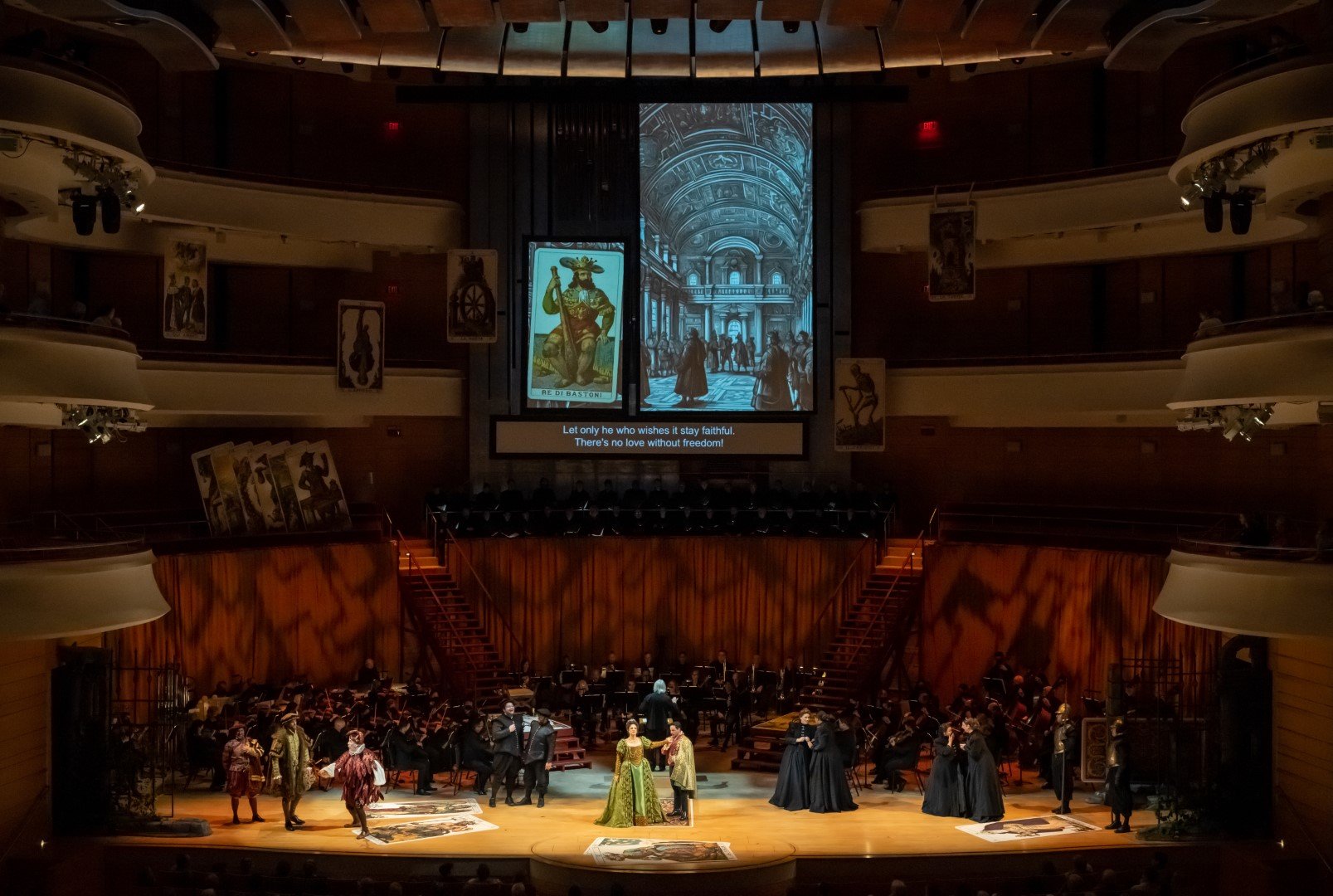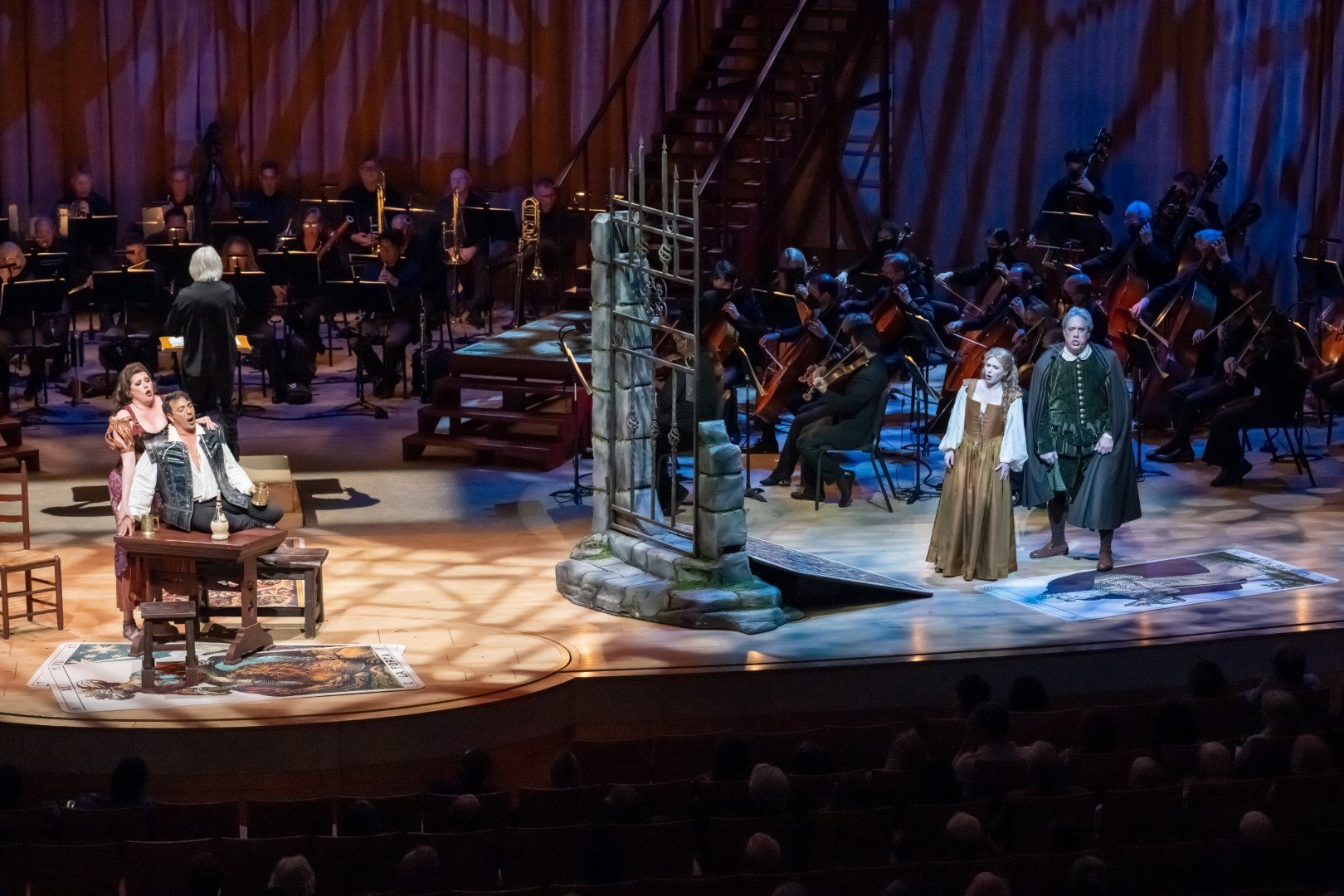'Rigoletto' in OC, one man's curse is others' delight
/By Truman C. Wang
4/22/2023
Photo credit: Doug Gifford
The Pacific Symphony in Costa Mesa presented a concert staging of Verdi’s popular Rigoletto. The direction, by the Met’s staff director Kathleen Smith Belcher, is effective and generally faithful to the composer’s own staging instructions. There are no annoying ‘funny business’ going on in the background during important arias and scenes: Gilda sings “Caro nome” alone; the Duke sings “Parmi veder le lagrime” as a true soliloquy without interference from the courtiers; the dramatic freeze action in Act I scene 1 that throws Rigoletto’s verbal abuse and cruelty into relief and shows why he deserves the bad karma (maledizione) placed upon him by Count Monterone, one of his victims.
John Iacovelli’s scenic design is also effective and well thought out. The prominent background unit set with left and right staircases has been seen in all the Pacific Symphony opera stagings. Combined with lighting effects, it has served well as Turandot’s throne room, Otello’s ramparts, and now Rigoletto’s Ducal Palace. There are giant animated tarot cards above the stage, foretelling the fate of the characters in a given scene. The orchestra sits on stage below the set, with various small props placed in front. One main prop is the front gate of the house where Gilda has been secretly kept (it is miscalled Rigoletto’s house by most opera programs, including this one; he doesn’t live there himself.) It also serves as the tavern’s door in Act III.
The assembled cast, looking beautiful in sixteenth-century Venetian Renaissance costume, is led by baritone Stephen Powell. He is an outstanding Rigoletto, unleashing large reserves of power for “Cortigiani!” His performance was rounded, consistent, securely voiced and moving. He was also entertaining in the first scene. More than singing, a good Rigoletto must know the tricks of the court jester trade, that he’s paid to be funny, to jibe, joke and amuse.
Alisa Jordheim, the Gilda, was beautiful, delicate and passionate. Like most Gildas today, Jordheim is a light coloratura, not a full lirico spinto, for which voice the role is written. (The first Gilda, Teresa Brambilla, was an Abigail in Nabucco.) Jordheim is a brave, spirited singer, able to ring out in “Si, vendetta”, and ride the storm trio, to crown the climax of the quartet. She can float limpid, affecting high notes and turn accurate, shapely coloratura in “Caro nome.” (A few small quibbles: the long rising scale before the cadenza was sloppy, her trill was not good, and she overlooked the portamento slurs on the words “tempio” and “Iddio” in Act II “Tutte le feste” – admittedly hard to do for a light soprano.)
As the Duke of Mantua, Santiago Ballerini displayed a supple, easy tenor voice, but it is not an Italianate voice. The top does not ring, the tone is often flat and unsupported when singing below forte, making him sound like a crooner and not a very good one at that. At least he gets to sing the Duke’s Act II cabaletta “Possente amore” that is often cut, but only one strophe instead of two. Most of the evening, one had to suspend disbelief that this Duke was able to seduce his conquests at all.
The supporting cast are uniformly topnotch: Peter Volpe’s Sparafucile, Alissa Anderson’s Maddalena, and Franco Pomponi’s Monterone in two memorable cameos. The Pacific Chorale does an excellent job of singing courtiers and providing chilling sound effects in the storm.
Carl St. Clair’s conducting was supple, sensitive, and exciting. Happily he did not ignore Verdi’s repeated pianissimo markings in “Si, vendetta” like a lot of conductors I know. The first flute, Benjamin Smolen, made much of the important role Verdi assigned him. A few traditional cuts are made here, including the aforementioned “Possente amore”, and one third of “Ah! Veglia o donna” in Act I. But why cut when it only saved two minutes in total?
One performance remaining, on April 25.
Truman C. Wang is Editor-in-Chief of Classical Voice, whose articles have appeared in the Pasadena Star-News, San Gabriel Valley Tribune, other Southern California publications, as well as the Hawaiian Chinese Daily. He studied Integrative Biology and Music at U.C. Berkeley.







